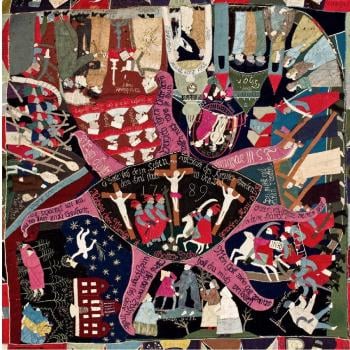Americans who stand outside these favored circles feel cheated and powerless. Worse still, it is not clear if either party possesses the vision and moral fortitude to navigate the nation through this storm. What if America has become ungovernable? What if the problems that beset us cannot be rectified by a new President, a new party, new policies? What if the problem is us, that we are so sated with materialistic consumption that we no longer hold our representatives accountable; that we no longer vote and legislate on the basis of principle but according to the whims of fashion and self-interest; that we too (and not just our representatives) are addicted to government spending and unwilling to confront the appalling realities of our collected indebtedness and the sacrifices it will require of us; that we have self-segregated into a thousand warring camps, and would rather bicker and demonize than stoop into the trenches of social problems and strive together with every bone, muscle, and tendon to solve them?
With regard to the Church, the intuition is felt especially (though not exclusively) among younger believers: that the American evangelical Church, in spite of all the good it still accomplishes, has lost its way. In the vision of Christian life that has been passed down the stream of generations, something essential seems to have been lost in the exchange. Call it a hunch, buried deep in the inner folds of the spirit within: that Christ calls us to something more than this. God did not become incarnate, endure the indignities and humiliations of the human condition, suffer rejection and persecution, torture and death, so that we might live comfortable lives of suburban complacency, lives more characterized by rampant consumerism than radical obedience, by cultural accommodation than counter-cultural witness, by potlucks and stewardship seminars than the persecutions and sufferings of the saints.
Each of these intuitions, in my view, is correct. And all are related. Christians are existentially committed to the proposition that Jesus Christ is the hope of the world. The Church is the bearer and messenger of that hope. If our nation has lost its hope, it is because the Church has failed to be the Church. If the light of our nation is fading, it is because we are failing to be the light. If our national character has decayed, it is because we have failed to be the salt.
Yet what exactly is the disease that ails the Church, and that eats away at the very bones of our society and culture? Interpreting an intuition is not an easy matter, and evangelicals have separated into competing tribes over their sense of it.
Some wish to take the Anne Rice option and reject "Christianity" for the love of "Christ." It may be tempting to separate oneself from all the faults of the Church in one shining moment of righteous defiance, but this cannot be right. Scorning other Christians does not mean that you are a better follower of Christ. It means that you suffer from spiritual pride, a desire to curry favor with the world, and theological incoherence. There are no sins in American Christendom that are unique to American Christendom. The Church is the body of Christ in the world -- a broken body, not a congregation of the sanctified but a fellowship of sinners seeking to follow Christ together. Christ loves and guides and edifies the Church not in spite of its faults, but in and through them. It is in our sinfulness that God teaches us His grace, in our weakness that we see His strength, in our foolishness that we learn His wisdom. We cannot become who we are meant to be apart from the community of believers. And the Church is not merely for us. Its teaching authority, its sacraments, and its ministries, are sorely needed in a hurting world. Christ does not abandon his Bride -- and neither should we.
What truly ails the Church, I am convinced, is that it has rejected the call to the imitation of Christ. Christ did not die upon the cross so that we should never bear crosses of our own -- indeed he calls his disciples to take up their crosses daily and follow. The way of Christ is the way of the cross, and the way of the cross is diametrically opposed to the way of the world. Yet we do not bear crosses anymore; we bear the sweet burdens of worldly idols and ambitions. The Church fell in love with the extravagant comfort and consumerism of American society, its sumptuous materialism and endless distraction -- and became unwilling to follow Christ into sacrifice and suffering, into the life of the disciple that is fiercely focused on walking in the Savior's footsteps. If the Church today lives at peace with the world, it is because it has become so like the world, so harmless to it, that it no longer presents a substantial threat to the ways of worldly sin.
To be clear, living our lives in the imitation of Christ is not required in order to be saved, but it is required of the saved, as it is essential to the true life of faith in the world. In imitating Christ we are shaped into his likeness -- in becoming more like him we come to know him -- and in coming to know Christ we come to know God. Apart from imitation, faith is a matter of cheap grace or therapeutic sentimentalism. For all the ways in which it is mocked, and all the ways it was co-opted for commercial purposes, "WWJD" is the essential question of Christian sanctification.





